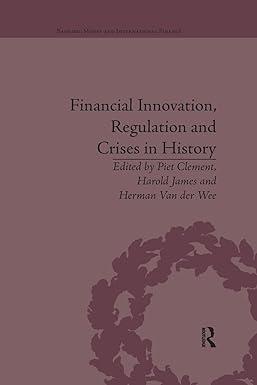Question
Question 65: Once a contract has been terminated, the contracting officer may not modify or rescind the notice without: (a) Approval of the Head of
Question 65: Once a contract has been terminated, the contracting officer may not modify or rescind the notice without: (a) Approval of the Head of the Procuring Activity (b) The contractors consent (c) Audit by the Government Accountability Office (d) Audit by the Defense Contract Audit Agency
Question 66: The plant clearance period begins: (a) On the effective date of contract termination (b) When the contractor submits acceptable inventory schedules (c) 24 hours after the contractor receives the Notice of Termination (d) When the contractors personnel office receives notice of the termination
Question 67: Use of the basis for settlement proposals is generally preferred by the Government. (a) Total cost (b) Inventory (c) Percentage of completion (d) None of the above
Question 68: A contractor may not request an amount in excess of the contract price in a termination claim except: (a) When he/she is operating on a loss and the contract is nearly completed (b) For settlement expenses (c) When authorized by the contracting officer (d) None of the above
Question 69: The contractor may charge storage costs for termination inventory starting from: (a) The date of termination (b) The beginning of the plant clearance period (c) The end of the plant clearance period (d) The date that he/she submits acceptable inventory schedules
Question 70: The established base used for measurement of contract performance is called the: (a) Contract Target Cost (b) Contract Budget Base (c) Performance Measurement Baseline (d) Control Account Performance Summary
Question 71: Earned value management is an integrative approach which brings together to give the program or project manager an effective system for managing the program/project work. (a) Cost (b) Schedule (c) Technical planning and control (d) All of the above (e) Only (a) and (b) above
Question 72: The cost actually incurred and recorded in accomplishing the work within a given time period is called the: (a) Cost Variance. (b) Budget at Completion. (c) Actual Cost of Work Performed (ACWP). (d) Budgeted Cost for Work Performed (BCWP).
Question 73: To trigger a formal schedule or cost performance analysis, the program office establishes: (a) Variance thresholds (b) Scheduled review points (c) End of contract assessments (d) Periodic meetings depending on performance achievement
Question 74: The most important and critical part of earned value is: (a) The accurate determination of the actual cost of the work performed (b) A realistic approach to work package planning and BCWS values for milestones (c) The use of a computerized system for collecting data and calculating performance (d) The determination of cost performance compared to the originally developed plans
Question 75: is responsible for evaluating the reasonableness of the offered prices. (a) Contracting officer (b) Price analyst (c) Engineer (d) Contract auditor (e) None of the above
Question 76: Cost estimates are submitted by contractors in connection with: (a) Modification and change proposals (b) Prices of spare parts (c) Rates for time and material contracts (d) Estimated and final costs of cost type contracts (e) All of the above
Step by Step Solution
There are 3 Steps involved in it
Step: 1

Get Instant Access to Expert-Tailored Solutions
See step-by-step solutions with expert insights and AI powered tools for academic success
Step: 2

Step: 3

Ace Your Homework with AI
Get the answers you need in no time with our AI-driven, step-by-step assistance
Get Started


